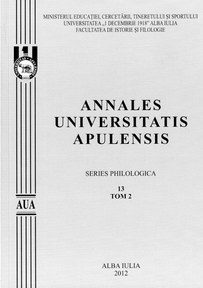ANACOLUTUL… ÎNTRE ABATERE LINGVISTICĂ ŞI FIGURĂ DE STIL
The anacoluthan … between linguistic exception and figure of speech
Author(s): Valerica SporisSubject(s): Language and Literature Studies
Published by: Universitatea »1 Decembrie 1918« Alba Iulia
Keywords: correctness; deviation; anacoluthon; nominativus pendens, particula pendens
Summary/Abstract: Linguists have always been interested in refining their own language. Yet, in a period in which the focus is on technology, “literary language” becomes an ever remote target. In both written and oral communication correctness entails rigorously abiding by norms of the current literary language. Violation of the linguistic and literary norms means deviation and this has two meanings: error (undeliberate deviation) or poetic licence (deliberate deviation). The anacoluthon is a grammar (syntactic) deviation – incoherence of communication, lack of sentence cohesion, faulty syntactic relation, as well as a stylistic one – lack of clearness and precision, ambiguity. The anacoluthon means a lack of logical and syntactical functional character within the flow of speech caused by an unexpected breakage in the syntactic level of the utterance. After this breakage has occurred, communication reiterates later on shaped by another syntactic pattern. Even if the utterance keeps the original meaning, it violates grammar norms. Among the causes which led to the emergence of the anacoluthon there are: losing control on the content of discourse, the speaker`s current mood, the speaker`s relaxation or lack of knowledge, the appearance of some disturbing factors, verbosity, etc. The anacoluthon as linguistic deviation is frequently encountered in oral and informal speech as well as in proverbs, it emphasises the value of spoken language and it proves Romanians` spontaneity.
Journal: Annales Universitatis Apulensis. Series Philologica
- Issue Year: 13/2012
- Issue No: 1
- Page Range: 379-387
- Page Count: 10
- Language: Romanian

